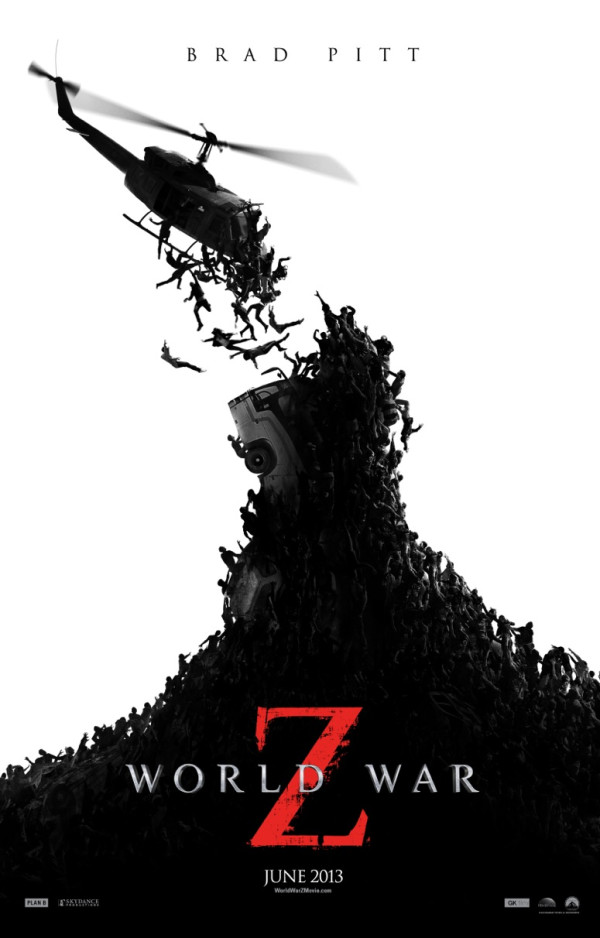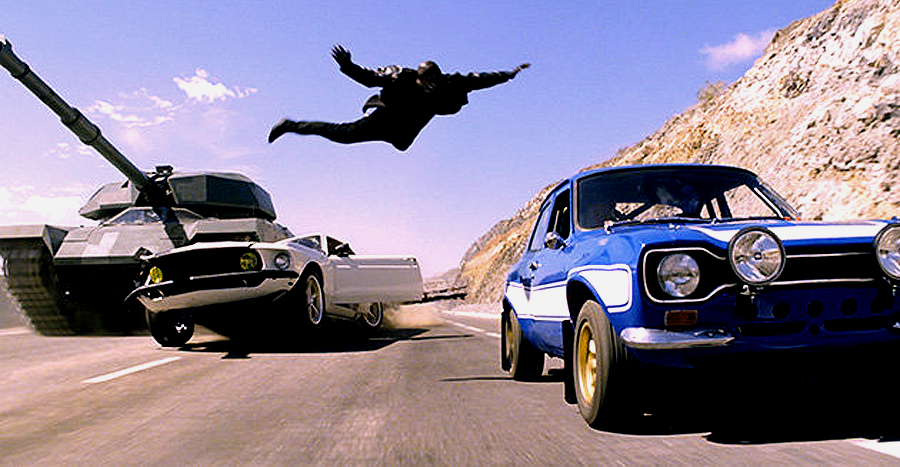Movie Review: World War Z
 Almost overnight, the world’s population begins to succumb to a vicious virus that transforms its host into zombies almost instantly. Former United Nations investigator Gerry Lane (Brad Pitt) finds himself at the center of the madness as he is tasked with finding patient zero and a cure for the virus. With the fate of the world, not to mention his own family, hanging in the balance, Gerry travels across the globe in order to put together a working vaccine and save humanity as we know it.
Almost overnight, the world’s population begins to succumb to a vicious virus that transforms its host into zombies almost instantly. Former United Nations investigator Gerry Lane (Brad Pitt) finds himself at the center of the madness as he is tasked with finding patient zero and a cure for the virus. With the fate of the world, not to mention his own family, hanging in the balance, Gerry travels across the globe in order to put together a working vaccine and save humanity as we know it.
Any review of World War Z would be, in my opinion, incomplete without at least mentioning its relationship to the book it is (extremely loosely) based on. I read Max Brooks’ “oral history of the zombie war” a few years back and loved it. It is one of the most intelligent, uniquely structured pieces of science fiction in recent years and as I read it I could easily envision a fantastic film. This is not the film I envisioned. Production on World War Z was an absolute disaster as tension between Pitt and director Marc Forster was so thick that they reportedly would not speak to each other on set. The third act of the film had to be completely reshot after it became apparent that the conclusion was entirely too dark and the budget ballooned to a reported $400 million dollars (the most expensive movie in history). Somewhere in all of that the foundation of the novel was lost entirely. As we learned more and more about the movie, it became readily apparent that the film would have almost nothing to do with the book save the title. I was angry. I’m not one of those people that needs a movie to be EXACTLY like the book it is based on but I’ll never understand the point behind spending the money to acquire a book if you’re not going to use the book at all in the formation of your film. As such, I expected World War Z to be a total train wreck.
 I was wrong. Perhaps it was my incredibly low expectations, but World War Z worked for me on virtually every level. It works as a horror movie, as an action movie, as a piece of post-apocalyptic (or in this case pre-apocalyptic) sci-fi and the elements the film borrows from each genre come together into a shockingly cohesive whole. This is one of the most intense action movies I’ve ever sat through and it uses scare tactics appropriately. That is to say, the film doesn’t go out of its way to create scares but rather allows the more horrifying aspects to come to the surface naturally. Meanwhile, the narrative develops quite well and I found myself much more invested in the lives of the characters than I ever imagined I would be. This is a smart zombie film that plays sort of like a combination of Steven Soderberg’s Contagion and The Walking Dead (on a $400 million budget). I felt like most of the twists and turns in the story made sense (save for a handful of MacGuffins in the second act) and Pitt does an excellent job of selling his character’s motivation, both on the micro (his family) and macro (the world) level. The third act comes together perhaps a little too neatly but somehow, despite a myriad of production issues that should have derailed the entire thing, Forster puts forth a conclusion that seems completely fitting to the film as a whole.
I was wrong. Perhaps it was my incredibly low expectations, but World War Z worked for me on virtually every level. It works as a horror movie, as an action movie, as a piece of post-apocalyptic (or in this case pre-apocalyptic) sci-fi and the elements the film borrows from each genre come together into a shockingly cohesive whole. This is one of the most intense action movies I’ve ever sat through and it uses scare tactics appropriately. That is to say, the film doesn’t go out of its way to create scares but rather allows the more horrifying aspects to come to the surface naturally. Meanwhile, the narrative develops quite well and I found myself much more invested in the lives of the characters than I ever imagined I would be. This is a smart zombie film that plays sort of like a combination of Steven Soderberg’s Contagion and The Walking Dead (on a $400 million budget). I felt like most of the twists and turns in the story made sense (save for a handful of MacGuffins in the second act) and Pitt does an excellent job of selling his character’s motivation, both on the micro (his family) and macro (the world) level. The third act comes together perhaps a little too neatly but somehow, despite a myriad of production issues that should have derailed the entire thing, Forster puts forth a conclusion that seems completely fitting to the film as a whole.
Against all odds, World War Z is a legitimately, shockingly good blockbuster that even borders on becoming great at times. It has almost nothing in common with the book from a narrative standpoint but it does share the novel’s intelligence and maybe that’s the most important thing in the end. Lastly, and perhaps most unexpectedly, there is a streak of hope that runs through the center of World War Z that you almost never encounter in a movie like this and the film feeds off of this subtle positivity in ways I never would have imagined, helping this film to become one of the best movies of the summer. Grade: A- (Rated PG-13 for violence, generally scary images, and mayhem)






